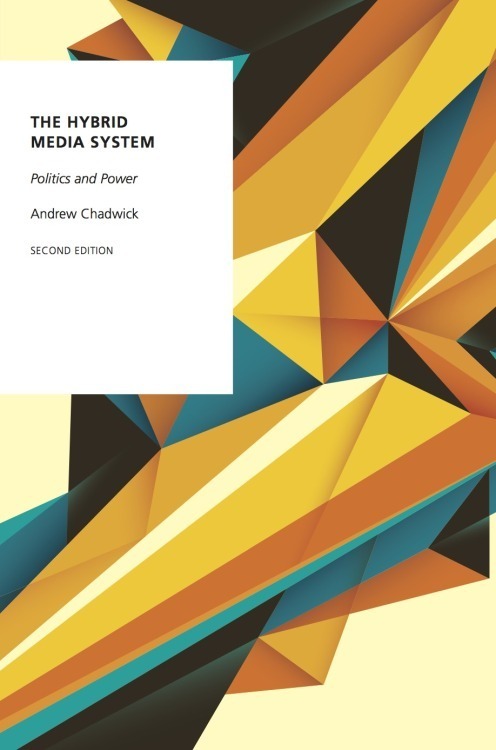Latest News
I recently completed an article commissioned by Zizi Papacharissi for her new edited book, The Routledge Companion to Digital Media and Democracy. It’s a future-oriented theory and overview piece that takes stock of the development of the research over the last 25 years or so. It’s titled ‘What is Gone and What Remains in the Research on Digital Engagement?’ I made the final mix shortly after the U.S. election result. You can download a preprint here.
New journal articles and a public report from O3C’s Leverhulme-funded project Understanding the Everyday Sharing of Misinformation, hot off the press:
Lawson, B. T., Chadwick, A., Hall, N-A., & Vaccari, C. (2025). The Trustworthiness of Peers and Public Discourse: Exploring How People Navigate Numerical Dis/misinformation on Personal Messaging Platforms. Information, Communication & Society, 28(4), 633–650. (Download pdf).
Chadwick, A., Hall, N-A., & Vaccari, C. (2025). Misinformation Rules!? Could “Group Rules” Reduce Misinformation in Online Personal Messaging? New Media & Society. (Download pdf).
Chadwick, A., Vaccari, C., & Hall, N-A. (2024). What Explains the Spread of Misinformation in Online Personal Messaging Networks? Exploring the Role of Conflict Avoidance. Digital Journalism. (Download pdf).
Hall, N-A., Hall, N-A., Chadwick, A., Vaccari, C., Lawson, B., & Akolgo, P. (2024). Research Update: Misinformation on Personal Messaging—Are WhatsApp’s Warnings Effective? Online Civic Culture Centre, Loughborough University. 28pp. (Press release) (Download pdf).
Hall, N-A., Chadwick, A., & Vaccari, C. (2023). Online Misinformation and Everyday Ontological Narratives of Social Distinction. Media, Culture & Society. (Download pdf).
During the 2024 UK general election campaign I worked with the Investigations team at ABC News to provide data analysis and contextual commentary in the week leading up to the broadcaster's scoop uncovering a coordinated foreign disinformation campaign targeting UK citizens on Facebook. The investigation resulted in statements by former Prime Minister Rishi Sunak and former Deputy Prime Minister Oliver Dowden and an ongoing investigation by the National Security Online Information Team in the Department for Science, Innovation and Technology. The revelations featured on the front page of The Sunday Times and in further follow-up stories in The Times, the Daily Mail, Sky News, the Independent, and the Evening Standard, among several other outlets. After publication of ABC's article, Meta issued a statement saying it had taken down the pages and their paid advertisements for “inauthentic behaviour deceiving people.” I was later interviewed by Germany’s main public news organization ARD-aktuell about my own further cross-platform investigation, which found that the racist, anti-immigrant accounts in the disinformation network on Facebook were also active on X/Twitter and targeting the UK and French elections.
I was interviewed by PoliticsHome, AFP, and the Daily Mail about social media and digital communication during the 2024 UK General Election campaign, and wrote a fun article for the Daily Mail dissecting the memes in UK parties’ TikTok campaigns.
I contributed (unpaid) to the White Paper on political honesty formally discussed on November 25 in the Welsh Senedd. It was prepared by the Institute for Constitutional and Democratic Research (ICDR), a non-partisan body of lawyers and academics that engages with select committee and public inquiries as well as officials in Westminster, the devolved legislatures and executives, and local government. I was a member of ICDR’s nine-member Working Group, which was established in the summer of 2024. The Group has developed a model regulatory proposal for the Senedd's Standards Committee to inform the Welsh Government's plan for a new law whereby politicians or candidates who are found by an independent judicial process to have deliberately lied and failed to correct the public record when formally given the opportunity will be disqualified from office. The White Paper develops an “in principle” model, which can be applied in either a civil law or criminal law context.
I served on the selection panel for the American Political Science Association’s Information Technology and Politics Best Book Award 2024. The winner is Alice E. Marwick’s The Private is Political: Networked Privacy and Social Media (Yale University Press).
Catherine R. Baker and I have a chapter, ‘Corrupted Infrastructures of Meaning: Post-truth Identities Online,’ out in Howard Tumber and Silvio Waisbord’s edited volume, Routledge Companion to Media Disinformation and Populism, which has just newly published in paperback.
The latest three titles in my book series Oxford Studies in Digital Politics are Meredith D. Clark (2025). We Tried to Tell Y'All: Black Twitter and the Rise of Digital Counternarratives; Leticia Bode & Emily K. Vraga (2025) Observed Correction: How We Can All Respond to Misinformation on Social Media, and Robert Gorwa (2024) The Politics of Platform Regulation: How Governments Shape Online Content Moderation. More details here.
I gave a talk at the Cheltenham Science Festival in the panel Seeing is Deceiving: Deepfakes. AI ethics adviser “Eleanor Morgan” participated, though “Eleanor” was actually a deepfake that fooled quite a substantial section of the audience before the experiment’s educational “reveal” at the end of the session. The panelists and festival organisers collaborated in the months leading up to the session to create and script the deepfake participant.
In the latest UK Research Excellence Framework (2021), Communication and Media at Loughborough was ranked 5th in the UK and submitted 40 full-time staff. Overall, 92% of its research was ranked in the two highest categories—'world leading' and 'internationally excellent'—with 65% ranked world leading: the highest possible award of 4 stars. Its research environment and research impact were each ranked joint 1st place in the UK, with the highest possible award of 100% 4-star quality.
[Page updated March, 2025]
Banner photo: View from the London Eye



